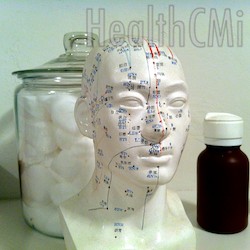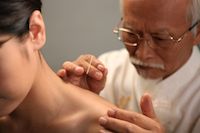A new report tracks the success of acupuncture for the treatment of schizophrenia.  This chronic mental disorder is characterized by mental fragmentation, illogic, disconnected emotional responses, delusions and a breakdown of the line between fantasy and reality. Researchers documented a case study wherein acupuncture improved daily functions, sleep and reduced pain, depression and mental disturbances due to hallucinations. This latest research is bolstered by additional research finding that acupuncture alleviates both schizophrenia and the side effects of psychiatric medication.
This chronic mental disorder is characterized by mental fragmentation, illogic, disconnected emotional responses, delusions and a breakdown of the line between fantasy and reality. Researchers documented a case study wherein acupuncture improved daily functions, sleep and reduced pain, depression and mental disturbances due to hallucinations. This latest research is bolstered by additional research finding that acupuncture alleviates both schizophrenia and the side effects of psychiatric medication.
Taking a look a this most recent research, a 63 year old woman suffered from chronic hallucinations of a bird “pecking her back.” She experienced physical pain as a result of these hallucinations. The hallucinations persisted but the patient “felt less disturbed by them.” The pain and depression, however, reduced significantly. This was accomplished in 12 acupuncture treatments at a rate of once per week for 3 months. A 3 month post treatment follow-up documented lasting results.
Related research concludes “that patients diagnosed with schizophrenia would benefit from acupuncture treatment alongside conventional treatment.” Acupuncture was effective in alleviating schizophrenia and the side effects of psychiatric medication. Acupuncture also improved energy levels, sleep, physical disorders and motivation.
The study documented a group of patients treated with acupuncture two time per week for a total of 10 weeks. Acupuncture caused a decrease in the “side effects of antipsychotic medication; decreased auditory, visual and tactile hallucinations; decreased anxiety and paranoia; improved sleep patterns… increased motivation including increased sex drive and ambition to further themselves in education and work; improved socialization and concentration… reduced addictive behavior in relation to alcohol and cigarettes; improved diet and weight loss; and improved exercise regimes.”
The study used the Traditional Chinese Medicine (TCM) differential diagnosis system to evaluate patients. This system is not directly translatable into biomedical terms given semantic differences. For example, some patients were diagnosed with phlegm heat harassing the mind and others were diagnosed with phlegm fire harassing the heart. In both cases, this is a very powerful form of shen disturbance in TCM. Shen is roughly translated to spirit and shen disturbance indicates mental and emotional disturbances.
The phlegm heat affecting the heart and mind diagnoses refer to a physiological process by which psychoemotional disturbances occur. In TCM, acupuncture and herbal medicine are often used to re-balance internal medicine physical imbalances to treat these presentations of schizophrenia. Schizophrenia is treated as a physiological imbalance resulting in a mental condition rather than merely an isolated mental disorder apart from biophysical processes.
In some cases, these diagnoses combined with blood deficiency of the heart and liver. Other TCM diagnoses determined by the researchers included liver fire flaming upward with rising liver yang; kidney yin deficiency and phlegm fire harassing the mind; kidney and spleen deficiency with dampness; liver Qi depression and qi stagnation; blood deficiency, qi stagnation and non-interaction between the heart and kidney; and heart fire. 
Another study published in The Journal of Brain Disease reported that the herbal formula Yi Gan San may be helpful in treating schizophrenia and neuropsychological disorders because it restores brain glutathione levels. In another study published in Progress in Neuro-Psychopharmacology and Biological Psychiatry, researchers concluded that Yi Gan San is a serotonin modulator and is a “safe and useful” formula for treating behavioural and psychological symptoms of dementia and borderline personality disorder. The study also shows significant improvements in tardive dyskinesia, psychosis and schizophrenia.
References:
Bosch, Peggy, Heike Staudte, Maurits van den Noort, and Sabina Lim. "A case study on acupuncture in the treatment of schizophrenia." Acupuncture in Medicine (2014): acupmed-2014.
Ronan P, Robinson N, Harbinson D, Macinnes D. A case study exploration of the value of acupuncture as an adjunct treatment for patients diagnosed with schizophrenia: results and future study design.. Zhong Xi Yi Jie He Xue Bao. 2011 May;9(5):503-14. Canterbury Christ Church University, Canterbury, Kent, UK.
Shi GX, Liu CZ, Li QQ, Zhu H, Wang LP. Acupuncture and Moxibustion Department, Beijing Hospital of Traditional Chinese Medicine affiliated to Capital Medical University, Beijing, China. Journal of Traditional Chinese Medicine. 2012, 32(2):199-202.
Huang, Lin-na, An, Jun-ming, Su, Tong-sheng; Wang, Pu; Dong, Lan; Zhang, Ruo-ping; Ren, Yu-juan; Ren, Yuan-yuan. Therapeutic efficacy observation on scalp acupuncture for vascular dementia. Journal of Acupuncture and Tuina Science. 2012-02-01.

